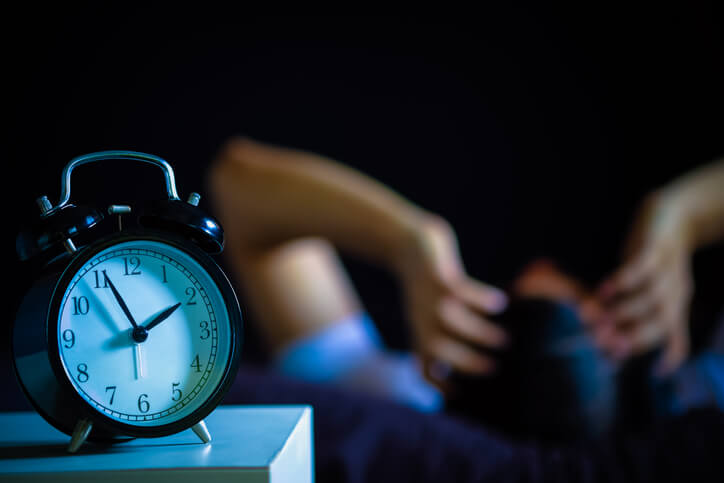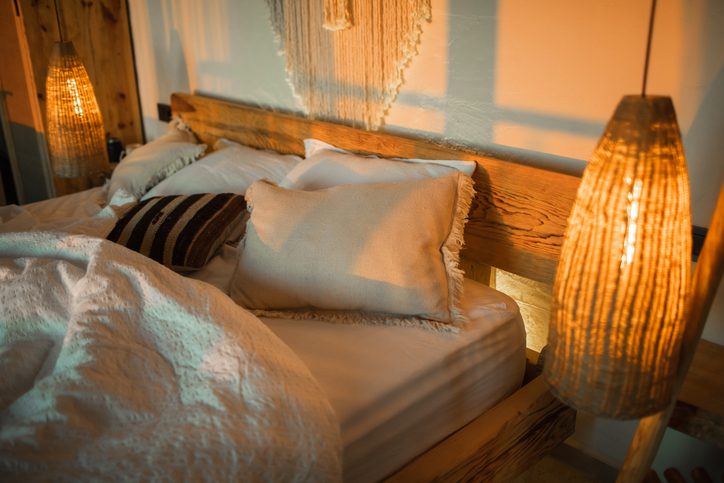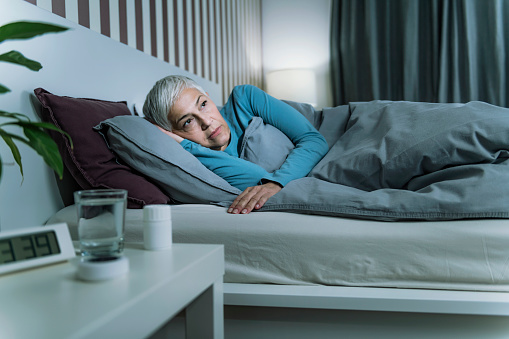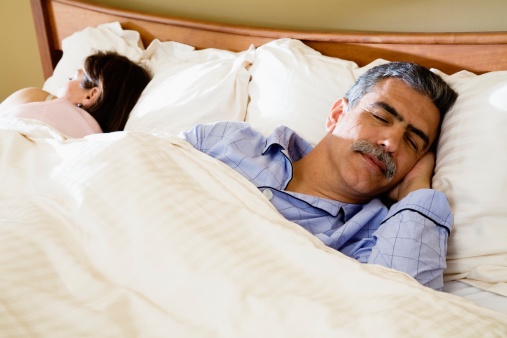More than 30% of Americans are perpetually sleep-deprived, according to the U.S. Centers for Disease Control (CDC). Sleep deficiency contributes to a wide range of potential health and safety problems. As we age, it’s important to develop and maintain good sleep patterns to help our short-term and long-term health.
Medical experts recommend that all adults should get between seven and eight hours of sleep each night, according to the CDC. And although it can be challenging for adults at any age to obtain enough quality sleep on a regular basis, some older adults have difficulties. Here’s why quality sleep is so important and how you can improve your sleep even as you age.
Common Sleep Problems
A lack of sleep can be dangerous or damaging to the health of any individual, but the older you are, often times the greater the risk of losing sleep is. As you age, changes to your body’s internal clock may cause you to wake up earlier.
Adults aged 50 and older often report having trouble falling asleep, sleeping fewer hours, waking up frequently and getting less quality sleep. In some cases, these sleep problems are the result of medications or existing conditions, such as diabetes, bladder control issues, cardiovascular conditions, arthritis or other chronic pain conditions. Diabetes or heart disease, for example, may cause you to wake more during the night to use the bathroom. However, if you’re experiencing sleep problems and you don’t have existing conditions and aren’t taking medications that could affect your sleep, you may have a primary sleep disorder, according to Healthline.
Some of the common sleep disorders experienced by older adults include:
- Sleep apnea, which is marked by breathing that repeatedly starts and stops during sleep. If you’re frequently sleepy during waking hours and your partner says you snore often, you may have sleep apnea.
- Restless legs syndrome (RLS), which is characterized by a nearly irresistible urge to move one’s legs and typically worsens with age. If you have an uncomfortable, “pins and needles” feeling in your legs while resting, you may have RLS.
- Circadian rhythm sleep disorders, a group of sleep disorders that cause a disruption to the body’s internal clock that manages the sleep-wake cycle. Common warning signs are having difficulty falling asleep at night or difficulty waking up in the morning.
- Insomnia, or habitual sleeplessness, often caused by poor sleep habits, depression, anxiety, lack of exercise, chronic illness, or certain medications. If you can’t fall asleep at bedtime or wake up during the night and can’t go back to sleep, you may suffer from insomnia.
- Periodic Limb Movement Disorder (PLMD), which causes involuntary movements of the arms and legs, which often disrupt sleep. PLMD is characterized by periodic jerking movements in the limbs (but not the tingling sensation associated with RLS). Many people with RLS also have PLMD, but those with PLMD don’t necessarily have RLS.
Dangers of Sleep Deprivation

Getting enough sleep is crucial for good health and basic safety. For instance, if you don’t sleep well or enough at night, you may deal with daytime sleepiness or fatigue. That lack of sleep can cause you to experience physical and mental symptoms such as slower reaction times, poor mood, inattention and trouble focusing. Daytime sleepiness or fatigue can make you more likely to experience falls or less able to avoid accidents. If you operate machinery or a motor vehicle without enough sleep, you can put yourself and others at risk.
For instance, the performance of a driver after 17 hours without sleep is as bad as driving with a blood-alcohol level of .05 percent, and that of a driver after 24 hours without sleep is as dangerous as a driver with a blood-alcohol level of .10 percent, according to the Sleep Health Foundation.
Learn more about recognizing the signs of drowsy driving and tips to avoid falling asleep behind the wheel.
In addition to the environmental dangers of activity without proper sleep, losing sleep can also contribute to several serious health problems. For instance, sleeping less than seven hours per day is associated with an increased risk of developing chronic conditions such as obesity, diabetes, high blood pressure, heart disease, stroke and frequent mental distress.
How to Fall Asleep Fast
If falling asleep or getting enough quality sleep each night is a challenge for you, there are several steps you can take to learn how to fall asleep fast and improve your chances of getting a quality night of sleep. Consider the following ideas to try to boost your ability to get to sleep and stay asleep all night long.
- Avoid using electronic devices 30 minutes before bed. The screen’s blue light can disrupt your Circadian rhythm or natural sleep cycle.
- Stick to a schedule. Try to go to bed at about the same time every night and rise at about the same time every morning. When traveling, try to adjust your sleep schedule to match the time zone you’re traveling to in order to avoid jet lag.
- Avoid drinking liquids before bed. Especially if you tend to wake up regularly during the night to empty your bladder, try not to drink anything for an hour or two before going to sleep.
- Monitor your food intake before bed. You’ll rest better if you’re neither hungry nor stuffed when you go to sleep.
- Pay attention to the effects of nicotine, caffeine and alcohol. Nicotine and caffeine can make it difficult to fall asleep. Alcohol may make you feel sleepy at first but can often lead to wakefulness later in the night. If you usually drink coffee in the afternoon, try switching to green tea, as the caffeine content is lower and may help you sleep.
- Create a sleep environment that has a calming effect. Make sure your bedroom is dark, comfy, cool (between 60 and 67 degrees Fahrenheit) and quiet to promote the best possible sleep.
- Consider a sleep number pillow. Having a comfortable pillow can make a world of difference. Be sure to find something that supports your head a neck.
Foods That Help You Sleep

Sometimes, sleep issues are related to your diet. Consider adding some sleep-promoting foods to your diet, especially if you like to eat a bedtime snack.
Some of the best foods to eat before bed include nuts, especially almonds and walnuts, which can increase melatonin (a hormone that promotes sleep). Other foods that can help you fall asleep faster and sleep more soundly include:
- oatmeal
- popcorn
- whole wheat crackers
- peanut butter
- other complex carbohydrates
Chicken is a good source of tryptophan, an essential amino acid that’s turned into serotonin and melatonin to help regulate your sleep cycle, as well as other protein-rich foods such as:
- ground beef
- milk
- nuts
- seeds
- honey
Try Sleep Tea

Herbal teas are ideal for bedtime since they help promote sleep.
The following list of sleep teas include antioxidants that have a calming effect to help induce sleep and improve sleep quality. Bedtime teas can be an easy way to get a better, healthier sleep.
- chamomile tea
- peppermint tea
- ginger tea
Should You Get Help for Sleep Issues and Learn How to Fall Asleep Fast?
If you’ve tried lifestyle changes, including foods that help you sleep and sleep tea for example, but still can’t get enough quality sleep or cannot develop a routine for how to fall asleep fast, you probably need to discuss your sleep issues with your doctor.
Start with your primary care physician, as they may be able to connect your sleep problems with an existing condition or a medication that you take. In some cases, simply changing medications may solve the problem.
However, if your sleep challenges continue or can’t be connected to an existing issue, you may need to see a sleep specialist — your primary care doctor can likely refer you to someone. A sleep doctor will discuss your symptoms and conduct a physical exam. They may ask you to keep a sleep diary for a few weeks that documents sleep patterns or your lists of foods that help you sleep (or in this case, are not working for you), or you may undergo a sleep study. In a sleep study, you sleep all night in a clinic, with sensors to monitor your breathing, body movements, heart rate and brain activity.
After a sleep study, the doctor can usually use the information gathered to diagnose whether you have a sleep disorder. If you do have one, they may treat the disorder with sleeping medicines, hormone therapy or a device — for instance, if the diagnosis is apnea, you may need a CPAP device.
Together, you and your doctor can devise the best plan for achieving a good night’s sleep each night so that you can experience the safety and health benefits of being well-rested.







Enjoyed the read